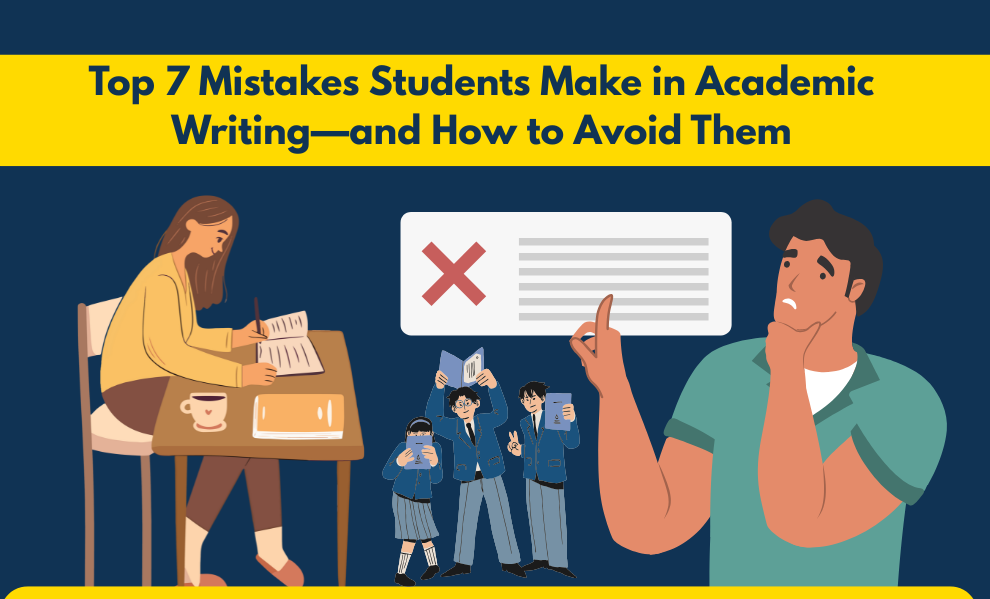BLOGS
7 Mistakes Students Make in Academic Writing—And How to Avoid Them

7 Mistakes Students Make in Academic Writing—And How to Avoid Them
Academic writing can be overwhelming for many students. Whether it's an essay, research paper, or assignment, the pressure to write well and avoid mistakes is real. Sadly, even the brightest students often make common writing errors that lower their grades. But the good news? These mistakes are avoidable.
In this blog, we’ll uncover the 7 most common academic writing mistakes students make—and how you can avoid them using practical tips. Whether you're looking for academic writing help, trying to avoid plagiarism, or fixing grammar issues in research papers, this guide is for you.
1. Not Understanding the Assignment Requirements:
The Mistake:
Many students rush into writing without fully understanding what the assignment asks for. This leads to off-topic content or missing sections.
How to Avoid It:
- Read the instructions carefully—twice.
- Highlight key points: topic, word count, formatting, and citation style.
- If anything is unclear, ask your professor before starting.
Student Tip: Always create a checklist from the assignment instructions to stay on track.
2. Lack of a Clear Thesis Statement:
The Mistake:
A thesis statement is the heart of your paper. Without a strong one, your writing may seem confusing or pointless.
How to Avoid It:
- Make your thesis clear, specific, and arguable.
- Place it at the end of your introduction paragraph.
- Keep referring back to it throughout your paper to stay focused.
Academic Writing Help: Your thesis should answer the central question of your assignment in one or two sentences.
3. Poor Organization and Structure:
The Mistake:
Jumping from one idea to another without a clear flow makes your paper hard to follow.
How to Avoid It:
- Use a standard structure: Introduction, Body Paragraphs, Conclusion.
- Start each paragraph with a clear topic sentence.
- Use transition words like “however,” “in addition,” and “on the other hand.”
Student Tip: Create a basic outline before you begin writing. It helps you stay organized.
4. Plagiarism (Intentional or Not)
The Mistake:
Using someone else’s work without giving credit is plagiarism—even if it’s accidental.
How to Avoid It:
- Always cite your sources, whether you quote or paraphrase.
- Use plagiarism checker tools before submitting.
- Learn the basics of APA, MLA, or Chicago style referencing.
How to Avoid Plagiarism: Use free tools like Grammarly or Turnitin to check originality and improve citation.
5. Grammar and Spelling Errors:
The Mistake:
Typos, subject-verb agreement issues, and awkward sentence structures hurt your credibility.
How to Avoid It:
- Use tools like Grammarly, Hemingway App, or Microsoft Word’s editor.
- Read your paper aloud to catch mistakes your eyes miss.
- Get a friend or classmate to proofread your work.
Grammar Issues in Research Papers: Pay attention to punctuation, verb tenses, and academic tone to maintain quality.
6. Using Informal Language or Slang:
The Mistake:
Academic writing requires a formal tone. Using casual language or texting-style abbreviations weakens your work.
How to Avoid It:
- Avoid contractions (use “do not” instead of “don’t”).
- Stay away from slang or conversational phrases.
- Replace vague words like “stuff” or “things” with specific terms.
Student Tip: Think of academic writing as a professional conversation—polite, clear, and structured.
7. Weak Conclusions:
The Mistake:
A conclusion that simply repeats your introduction or adds no value leaves a poor impression.
How to Avoid It:
- Summarize your key points without copying.
- Reflect on the significance of your findings.
- End with a strong final statement or a call to action.
Academic Writing Help: Your conclusion should answer “So what?” and leave your reader thinking.
Final Thoughts:
Academic writing doesn’t have to be a struggle. By understanding these common mistakes and learning how to fix them, you can boost your grades and write with confidence. Remember, writing is a skill—and like any skill, it gets better with practice and the right guidance.
Need a helping hand with your next assignment or research paper? Our expert academic writers are here to support you. Get personalized feedback, plagiarism-free content, and error-free writing that meets every requirement.
Spin & Win!
Try your luck for a special discount on your next order
Enter Your Details
Fill in your info to spin the wheel and claim your exclusive discount!
⏰ Offer valid for 24 hours only
